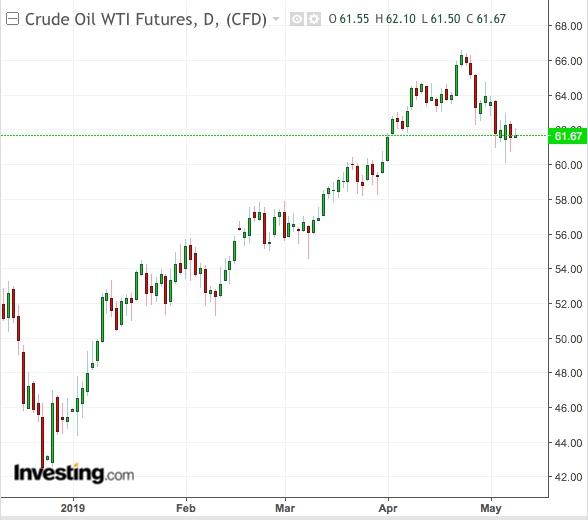In the world of oil sanctions, the Trump administration likes to think it’s already winning one battle and will soon triumph in the other.
But as Washington rewards, on Wednesday, a general who broke ranks with the Venezuelan regime the White House is trying to dislodge, Iran is readying to announce a partial withdrawal from a nuclear deal that has won it kudos from world powers—potentially pitting those governments against the U.S..
It’s still early to get a clear read on the impact of Tehran’s winding down of its commitments to the 2015 nuclear deal, which U.S. President Donald Trump tore up exactly a year ago, before imposing sanctions on Iranian oil exports. France, Britain, Germany, China and Russia—the other signatories to the deal that was a legacy of the previous Obama administration—have praised Iran for honoring its commitments thus far despite Trump’s actions.
But Tehran has also grown frustrated with world powers for their lack of support for the Islamic Republic in its battle against Trump, as well as with failure, from European counterparts, to create a new viable financial mechanism that would allow European firms to continue trading items such as medicines and humanitarian goods with the country and help it circumvent U.S. secondary sanctions.
Partial Withdrawal From Nuclear Commitment Iran’s Best Chance?
With only China standing up against Trump, to some extent, and Russia remaining an ally but being more focused on its own oil industry, the Hassan Rouhani administration believes a partial withdrawal from the 2015 accord gives it the best shot of persuading world powers to do battle on its behalf against the U.S. This is without doubt a calculated move, as its consequences—implying an Iran capable of enriching uranium to build nuclear weapons again—would be dreaded by all parties involved.
The Trump administration, of course, would pounce on Tehran’s move as vindication of its decision to cancel the nuclear deal. Iran hawks in the administration, led by National Security Advisor John Bolton, will rejoice at the opportunity of being able to push out even harsher action against Rouhani’s government. And a few of the world powers may actually approve this. The Guardian reports that France will consider economic sanctions, should Iran proceed as threatened.
Yet, Iran may have already sewn up a deal with Russia to help it survive the move. Simon Watkins, columnist at Oilprice.com, said the arrangement involves Russia giving Tehran $50 billion annually over five years at least in exchange for preference in the Iranian oil and gas sector, and also increases military co-operation. Russian firms would also have total autonomy as oil and gas developers in Tehran—including complete say over exactly how much oil is produced from each field and when, whom and how much it should be sold to.
Will Sanctions Relief For Maduro’s Men Do The Trick In Venezuela?
With Venezuela, Trump may have his best chance yet of alleviating the global oil crisis if sanctions relief and other immunity offered by Washington to incumbent President Nicholas Maduro’s lieutenants gather momentum.
RBC Capital said in a note last week that a sudden Maduro departure and transition to the Juan Guaido-led reformist government would set the pace for a quick revival of the Venezuelan economy.
Under such a transition, the United States would immediately rescind bilateral sanctions, including removing the national oil company PDVSA from restrictions under the Office of Foreign Assets Control, and lead international efforts to restore the nation’s relationship with the IMF and World Bank.

What RBC didn’t add was Trump’s chance of reopening nearly 1 million barrels per day of Venezuelan oil exports to the U.S.—the same heavy-grade crude that Saudi Arabia has been forcing the market to buy at much higher prices. A steady restoration of PDVSA supply to the U.S. could provide Trump with the lower crude—and consequently, gasoline—prices he needs for his 2020 reelection bid.
All this, of course, is based on the assumption that Maduro loyalists will bite the carrots dangled before them by the U.S. Guaido has had very limited success thus far in forcing a mutiny within the Venezuelan president’s inner circle. Although Wednesday’s desertion by Gen. Manuel Cristopher Figuera, the director of Venezuela’s intelligence service, Sebin, was one of the more high-profile defections, there was no certainty that it would spark a groundswell.
But even if it does, and Maduro’s regime falls faster than expected, the Saudis aren’t expected to give up high crude prices they’re enjoying now that easily. Their likely option? Cut even more supply to the market.
